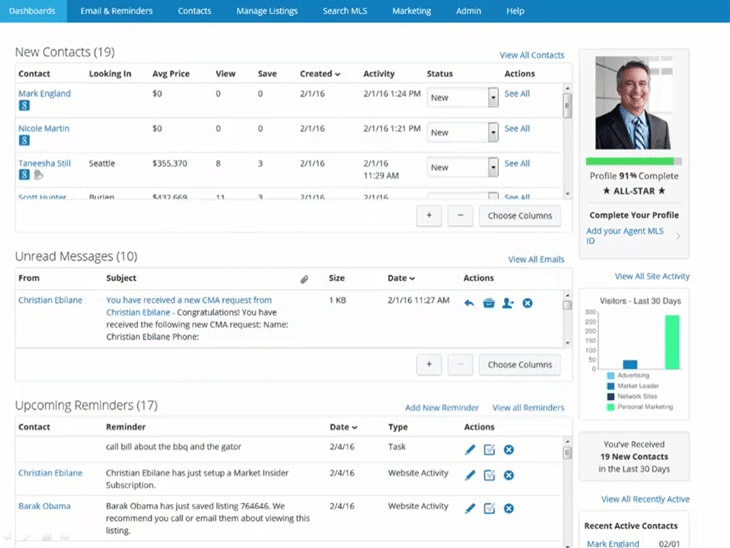Are you ready to make lasting connections and grow your real estate business? It’s all about having that perfect elevator pitch. This pitch will set the stage for building your brand and showing your expertise to new connections, guiding them toward becoming valuable leads. Check out my five simple steps to create a winning real estate elevator pitch with inspirational examples.
⭐Bonus: Grab our PowerPoint training to learn how to craft an impactful elevator pitch⭐

What Is a Real Estate Elevator Pitch?
Mastering the art of the real estate elevator pitch is crucial for any real estate professional. This concise and persuasive speech is designed to captivate your audience in 30 seconds to 2 minutes, sparking interest in who you are and how your expertise can benefit them. Whether in an actual elevator, at a networking event, or meeting a potential client, a compelling elevator pitch can open doors and lay the groundwork for meaningful conversations and opportunities.
1. Gather the Right Information to Share
The first step to creating the best realtor elevator pitch is carefully selecting what information to include. A strong realtor elevator pitch should highlight your expertise, demonstrate your value, and leverage the power of your brokerage. While only some details will make the cut, jot down everything during brainstorming. This will allow you to sift through the options and create tailored pitches for various situations.
To gather all the information you may want to include in your real estate agent elevator pitch, consider four primary categories and questions to ask yourself about those categories:
Show off your style & expertise
- What personal skills do you possess that assist your clients?
- What is your communication style?
- What is your ultimate goal as a real estate professional?
- What is your real estate niche, and how do you cater to that niche?
- How many properties have you sold or helped purchase in the past year?
Demonstrate your value as an agent
- What qualities assist your clients most (e.g., responsiveness, negotiations)?
- What do you do for your clients that sets you apart from other agents?
- How do you prepare and educate real estate clients for a sales transaction?
- What awards do you possess, and how do they increase value to your clients?
- What specialized knowledge do you have of the real estate market?
Detail your brokerage connections
- Are you part of a team? If so, how many people are on your team, and what is your role?
- How many properties have your brokerage sold or helped purchase in the past year?
- What marketing and advertising strategies do your brokerage leverage, and how do they benefit clients?
- Does your brokerage have a specific niche they concentrate on, and how is that beneficial?
- Does your brokerage use platforms (e.g., lead generation, listing sites, marketing, and advertising outsourcing) that are advantageous to clients?
Discuss why you are a real estate agent
- Why are you a real estate agent?
- What do you like about being a real estate agent?
- What led you to become a real estate agent?
- How is the role of a real estate agent a perfect fit for your personality and life?
- What makes you smile most as a real estate agent?
2. Identify Your Target Audience & Speak to That Audience
When crafting your real estate agent elevator pitch, it’s essential to keep your audience in mind. Consider what they want to hear, and include real estate terms and action items your ideal clients should know. You’ll want to tailor your pitch to the people or events you speak to.
For example, if you’re talking to experienced real estate investors, you’ll want to use terminology like net operating income, cash flow, equity, and debt-to-income ratio. On the other hand, if you’re addressing first-time homebuyers, use clear and straightforward language to explain pre-approvals, appraisals, mortgage contingencies, and how you can help them achieve their goals.
3. Organize Your Real Estate Elevator Pitch
Based on your niche audience and the answers to the questions above, organize your elevator pitch to create engagement and curiosity and leave room to continue the conversation. You are free to structure your sales pitch however best suits you and adjust it over time as you learn more about what people respond well to. However, many agents find it easier to create their pitches by following a template or viewing real estate sales pitch samples. A common formula of elevator pitch for realtors is from Allan Dib of Successwise:
“You know how [pain point]? Well, I [your solution]. In fact, [proof].”
Example: “You know how many young professionals think they need to save thousands of dollars before they can buy a house? Well, I help young professionals and families buy their first home without large upfront costs. In fact, last month, I helped a family of five close on a home with a large backyard for the kids with no down payment at all.”
An alternative formula could look like this:
| Present the problem: Your opening line should address a specific real estate problem you can solve for the potential client in front of you. It can be formed as a question or statement but should address the issue head-on. | “It’s difficult for first-time homebuyers to navigate and purchase in a seller’s market because of bidding wars, the low number of days on the market, and higher-than-normal market prices.” |
| Introduce your solution: Clearly describe your solution to the problem and what it looks like for your clients. | “I specialize in working with first-time homebuyers in this situation by educating them on the sales process, having responsive communication, and using database tools to get access to off-market listings.” |
| How you solve the problem: Describe how you solve the problem for your clients, like technology, client education, or marketing. | “Homebuying details cannot be overlooked, so I meet with my clients to review each step of the sales process and answer questions. I will also demonstrate our off-market database to show my clients how we find quality listings that meet their search criteria.” |
| Why you want to solve the problem: Add information about what drives you and why you’re interested in solving the posed problem for your clients. Expressing your personal experiences can build a connection between you and your leads. | “As a former teacher, I choose to work with first-time homebuyers to educate them on the homebuying process. It’s important to me to give my clients confidence in their decision-making throughout the transaction.” |
| Call to action and continue the discussion: Use a call to action (CTA) to bring the conversation back to the prospect so they can voice their concerns, add to the conversation, or ask questions. The goal is to finalize the connection, capture their contact information, and ultimately get a new lead. | “What are your thoughts about the current market?” |
4. Practice, Practice, Practice
According to the National Association of Realtors (NAR), 71% of buyers and 81% of sellers contacted only one real estate agent before beginning their transaction. When you have the opportunity to give your realtor pitch, you have an incredible opportunity to form connections and generate real estate leads.
Now that you’ve crafted your 30-second real estate pitch, it’s time to make it your own. Practice until it rolls off your tongue effortlessly. While memorization is important, it’s also vital to be adaptable to different audiences. To boost your confidence, try these diverse techniques to hone your pitch:
- Practice saying your real estate elevator pitch in the mirror
- Print it out and keep it with you to re-read and practice it frequently
- Record a video of yourself giving your pitch and watch it back
- Ask friends and family for feedback

Just a friendly reminder to keep this in mind: Being successful in real estate sometimes means stepping out of your comfort zone and working on your weaknesses. It might feel a bit uncomfortable at first, but practice and feedback are key to nailing your pitch and making a great impression on potential clients or new connections.
5. Collect Contact Information
Having a killer real estate agent elevator pitch is a fantastic way to supercharge your business, connect with potential leads, expand your network, and skyrocket your real estate brand. But remember, a pitch alone won’t magically boost your income or establish your authority in the community. The secret is using your elevator pitch as a launchpad to build genuine connections, gather contact information, and make a lasting impact!

Capturing someone’s contact information is easy, whether online or in person. It’s important to ensure that their information goes straight into your real estate CRM to avoid losing track of them. For instance, with Market Leader’s CRM, you can effortlessly send personalized texts and emails to your leads, as well as provide listing updates. You can also take advantage of a customizable real estate website and a complete marketing suite to create and send direct mail to your leads.
Pro tip: Having real estate marketing materials prepared will make it easy to build connections in any scenario, whether you’re hosting an event as a real estate professional or just running into someone at the grocery store. Make sure you’re prepared by having:
Real Estate Sales Pitch Examples
Get ready for some real estate inspiration! To craft your own winning elevator pitch, take a look at these stellar real estate pitch examples. Feel free to borrow some ideas, paste them into a document, and give them your own unique spin. Let’s make your pitch pop!
Buyer Example 1
“It’s difficult for first-time homebuyers to navigate and purchase in a seller’s market because of bidding wars, the low number of days on the market, and higher-than-normal market prices.”
“We specialize in working with first-time homebuyers in this situation by educating them on the sales process, having responsive communication, and using database tools to get access to off-market listings. Homebuying details cannot be overlooked, so I meet with my clients to review each step of the sales process and answer questions. I will also demonstrate our off-market database to show my clients how we find quality listings that meet their search criteria.”
“As a former teacher, I choose to work with first-time homebuyers to educate them on the homebuying process. It’s important to me to give my clients confidence in their decision-making throughout the transaction.”
“Tell me about your homebuying journey.”
Buyer Example 2
“Are you finding it a challenge to see a home you like in person before it goes off the market?”
“We have worked with over 400 first-time homebuyers to overcome obstacles seen in a seller’s market by following a strategic plan of client education, consistent communication, and technological database tools. Our brokerage works as a team to create custom searches through our database to guarantee you are viewing the most up-to-date market information. You will receive consistent email updates with new listings, price changes, and recently sold homes so you can understand the current market trends.”
“My brokerage has a collaborative environment that inspires me to work with my clients as a real estate team. I also love learning about the current market trends and imparting that knowledge to my clients so they feel confident when buying a home.”
“What are your thoughts about the current market?”
Seller Example 1
“When selling your property in a seller’s market, you must be competitive to attract multiple offers.”
“We specialize in working with sellers to advertise their listing on multiple platforms, design creative and engaging marketing materials, and bring in qualified buyers. Before listing a property for sale, I like to provide an extensive listing presentation to outline the process, address your questions and concerns, and explain my role throughout the transaction.”
“As a resident of the area, I am very familiar with the market trends and the community highlights that can draw in potential buyers, like restaurants, landmarks, and events. I like to use this local knowledge to guarantee that my client’s home is priced properly for a quick and seamless sale.”
“How long have you been living in the area?”
Seller Example 2
“How long has your home been on the market?”
“In a seller’s market, it’s best to minimize the number of days on the market to bring in the highest offers. Our company has worked with over 500 homeowners to sell their homes in an average of 10 days and 8% over ask. We use predictive technology to advertise to clients interested in buying sooner than later.”
“As an avid tech nerd, I have found that predictive technology in conjunction with social media is an effective way to attract clients and entice multiple offers. I love to create and review reports with my clients to demonstrate our technological abilities and determine our best avenue of success for a quick sales transaction.”
“Have you tried social media marketing and advertising to sell your home?”
What to Avoid in Your Real Estate Elevator Pitch
Remember to keep your real estate elevator pitch concise and compelling. You’ll naturally refine your pitch by following our tips and practicing it. Take a moment to review the elements to avoid before sharing your pitch:
- Do not start with “I’m a real estate agent”: This may be your first instinct at a networking event, but most people have preconceived notions of agents that will prevent them from hearing the most important pieces of your pitch.
- Don’t talk too fast: When you are nervous or uncomfortable, it is natural to speed through a conversation or speech, but this can deter potential clients from having an understandable discussion. Practicing your elevator pitch on your own and with friends and family will prevent this obstacle.
- Don’t use “um” or “like”: Speak confidently and practice your elevator pitch to avoid any unnecessary mumbling or stumbling.
- Eliminate repetitive or unnecessary information: Although you want to connect your thoughts, review the wording of your pitch so as not to repeat yourself. Don’t waste valuable time by including self-explanatory or irrelevant information.
- Don’t exceed 60 seconds: It’s called an “elevator pitch” because it should be deliverable in about the same time as you’d be on an elevator with the other party, so keep it short and memorable. Say your elevator pitch, have an informative conversation, exchange contact information, and then continue circulating to maximize lead generation opportunities at networking events like real estate conferences.
- Monotone language and movement: People will not only choose you as their agent for your skill but also your personality. Move naturally and show off who you are.
FAQs
How do you write an elevator pitch for real estate?
To write a compelling elevator speech for realtors, start by gathering the right information about yourself, your business, and your target audience. Build a structure that clearly communicates your brand and expertise. Make sure to conclude your elevator pitch with a question or call to action, and be prepared with easy ways to capture the new lead’s contact information.
What is an example of a hook in an elevator pitch?
A hook in an elevator pitch for real estate agents captures attention by highlighting a pain point of your target audience. It could be, “Are you tired of missing out on ideal houses because of bidding wars?” or “Imagine being able to purchase and move into a new home without depending on contingencies!”
What is the elevator pitch formula?
There are multiple versions of elevator pitch formulas from professionals in real estate or sales industries. The bottom line of every formula is that your pitch must include a problem your audience has, your solution, how you help clients solve the problem, and the next steps.
Bottom Line
When people ask real estate agents, “What do you do?” having a killer elevator pitch ready is vital. Nail that pitch, and you’ll build new connections and generate leads left and right. Showcasing your skills, interests, and the value you offer as a real estate agent during casual conversations and networking events is the way to go. Let’s hear your thoughts and experiences in the comments below!











Add comment